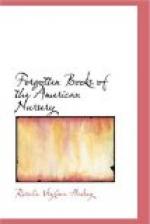To increase this special class of books, Hannah More devoted her attention. Her forty tracts comprising “The Cheap Repository” included “The Shepherd of Salisbury Plain” and “The Two Shoemakers,” which, often appearing in American booksellers’ advertisements, were for many years a staple article in Sunday-school libraries, and even now, although pushed to the rear, are discoverable in some such collections of books. Their objective point is best given by their author’s own words in the preface to an edition of “The Search after Happiness; A Pastoral Drama,” issued by Jacob Johnson of Philadelphia in eighteen hundred and eleven.
Miss More began in the self-depreciatory manner then thought modest and becoming in women writers: “The author is sensible it may have many imperfections, but if it may be happily instrumental in producing a regard to Religion and Virtue in the minds of Young Persons, and afford them an innocent, and perhaps not altogether unuseful amusement in the exercise of recitation, the end for which it was originally composed ... will be fully answered.” A drama may seem to us above the comprehension of the poor and illiterate class of people whose attention Miss More wished to hold, but when we feel inclined to criticise, let us not forget that the author was one who had written little eight-year-old Thomas Macaulay: “I think we have nearly exhausted the epics. What say you to a little good prose? Johnson’s ‘Hebrides,’ or Walton’s ‘Lives,’ unless you would like a neat edition of Cowper’s poems or ’Paradise Lost.’”
Miss More’s influence upon the character of Sunday-school books in England undoubtedly did much to incline many unknown American women of the nineteenth century to take up this class of books as their own field for religious effort and pecuniary profit.
Contemporary with Hannah More’s writings in the interest of religious life of Sunday-school scholars were some of the literary products of the painstaking pen of Maria Edgeworth.
Mention of Miss Edgeworth has already been made. About her stories for children criticism has played seriously, admiringly, and contemptuously. It is not the present purpose, however, to do other than to make clear her own aim, and to try to show the effect of her extremely moral tales upon her own generation of writers for American children. It is possible that she affected these authors more than the child audience for whom she wrote. Little ones have a wonderful faculty for seizing upon what suits them and leaving the remainder for their elders to discuss.
Maria Edgeworth’s life was a long one. Born in seventeen hundred and sixty-seven, when John Newbery’s books were at the height of their fame, she lived until eighteen hundred and forty-nine, when they were scarcely remembered; and now her own once popular tales have met a similar fate.




